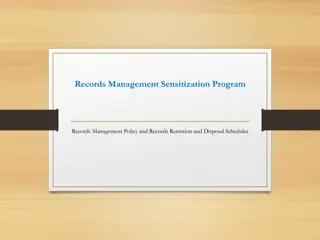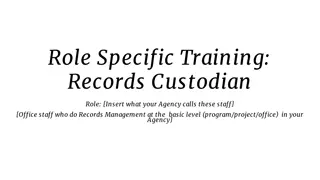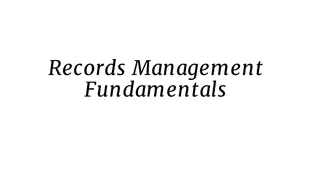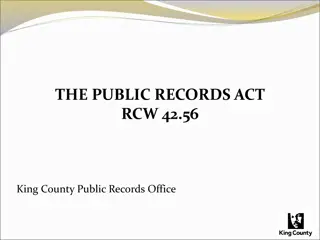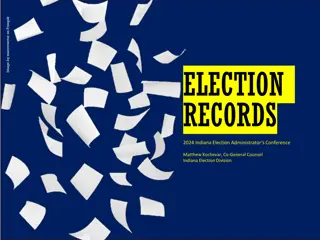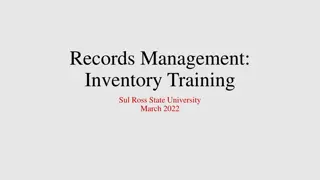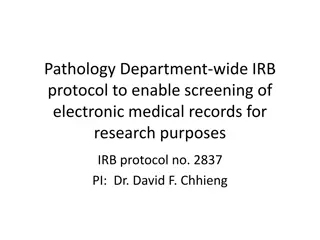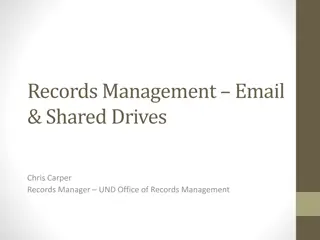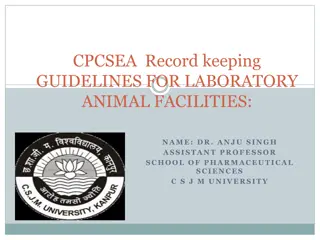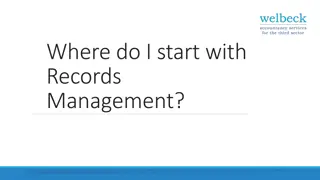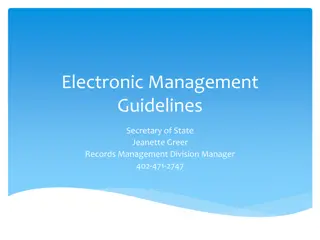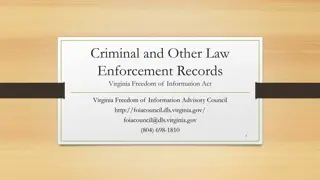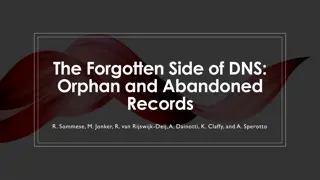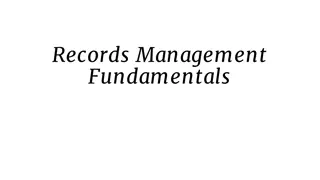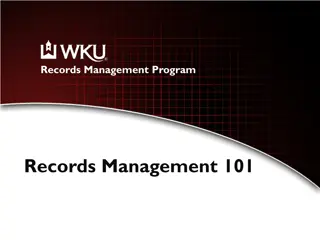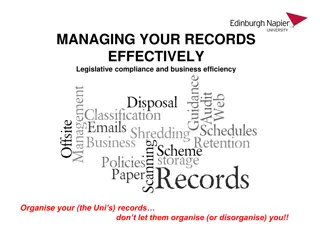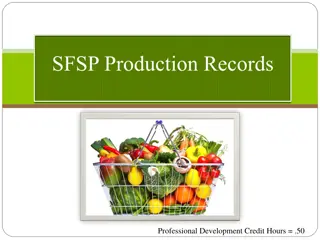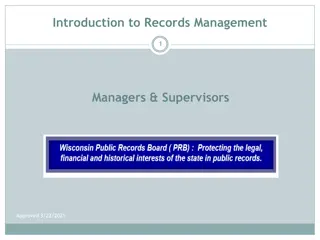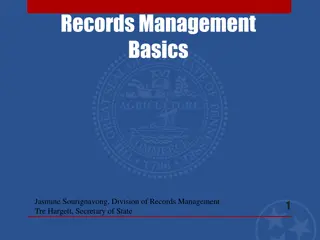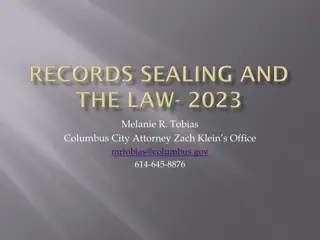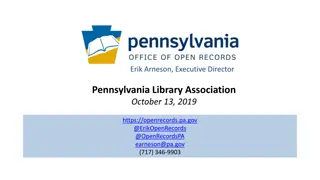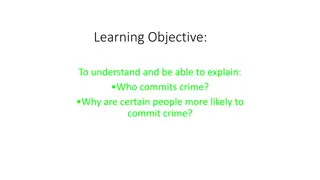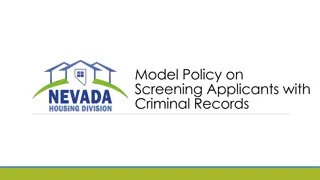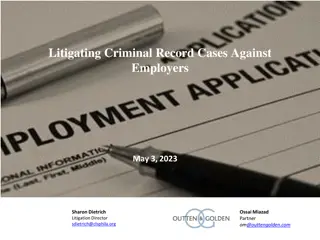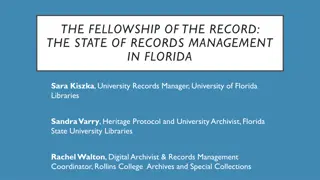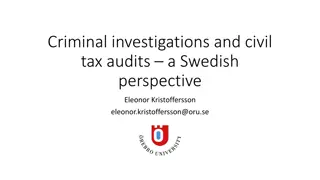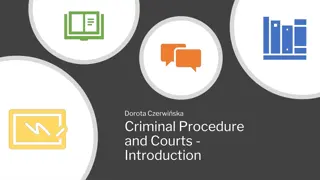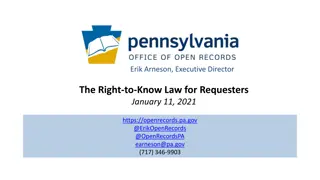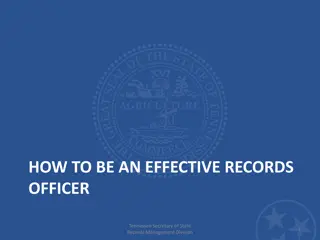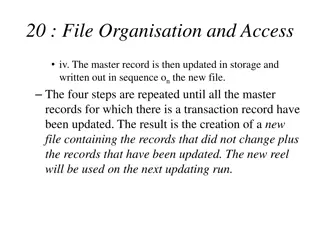NARA’s Regulation for Digitizing Permanent Records
NARA has issued regulations and guidance for digitizing permanent records, including the disposal of original analog records, with the aim of enhancing efficiency and accessibility. The process includes reviewing and updating regulations periodically, transferring metadata when records are transferr
1 views • 20 slides
Methods for Extending Streamflow Records and Their Importance
The presentation outlines methods for extending streamflow records, the reasons behind doing so, and the process of using the results. It includes examples of using data from long-term sites to estimate records at short-term sites. The importance of extending records is highlighted, emphasizing the
1 views • 48 slides
United Nations Survey on Crime Trends and Operations of Criminal Justice Systems
The United Nations Survey on Crime Trends and Operations of Criminal Justice Systems (UN-CTS) focuses on harmonizing data collection, identifying crime patterns, improving monitoring of the criminal justice system, and enhancing international comparability of crime statistics. It was mandated by the
3 views • 18 slides
Comprehensive Records Management Guidelines for COMESA Secretariat
Explore essential aspects of records management for COMESA Secretariat, including sensitization programs, records retention policies, valuable records identification, information sensitivity classification, and vital records preservation. Learn about the importance of maintaining records with admini
7 views • 9 slides
Role-based Training for Records Custodians
Role-based training slides for Records Custodians at your Agency, focusing on managing records at the office level and implementing records management policies and procedures, including applying retention schedules, understanding RM staff structure and policy, coordinating with Records Liaisons, and
0 views • 8 slides
Understanding Criminal Behavior from a Social Psychological Perspective
This unit delves into the application of social psychology in the legal system, exploring the nature of criminal behavior, responses to criminal acts, the criminal justice system, and rehabilitation. It examines the social ecological perspective of criminal acts and outlines key points related to th
0 views • 50 slides
Understanding Psychological Theories of Criminal Behavior
Psychologically-based criminologists attribute criminal behavior to individual factors such as negative early childhood experiences and inadequate socialization, leading to criminal thinking patterns and incomplete cognitive development. Probation and parole practices are influenced by rehabilitatio
0 views • 30 slides
Understanding Records Management Fundamentals for Federal Agencies
This training course outlines the essential responsibilities and procedures for managing federal records. Discover the importance of records management, how to identify federal records, and key resources to support effective records management practices within your agency.
2 views • 63 slides
Understanding the Public Records Act in King County
The Public Records Act in King County emphasizes the people's sovereignty and their right to access governmental records. It defines public records, explains the meaning of writing, and lists various types of records. The content also covers the format of requests and the legal obligations of agenci
1 views • 21 slides
Public Records Regulations in Indiana Elections
Indiana's public records laws dictate that most agency records, including election materials, are publicly accessible. However, certain voter registration and election records have exemptions. The rules cover the availability of records related to voter registration, election administration, and pos
0 views • 12 slides
Effective Records Inventory Management Training at Sul Ross State University
This content presents an overview of records inventory training conducted at Sul Ross State University in March 2022. It covers the importance of records inventory, benefits, step-by-step guidance, identification of non-records, and cataloging procedures for individual and departmental records. The
1 views • 9 slides
Role-Based Training for Records Liaisons
Utilize these slides to develop role-based training for Records Liaisons at your agency, as defined by NARA. Customize the content to suit your agency's specific needs in records management. No approval is required from NARA for customization. The training covers the responsibilities of Records Liai
1 views • 7 slides
Pathology Department IRB Protocol for Electronic Medical Records Screening
Pathology Department's IRB protocol enables the screening of electronic medical records for research purposes, allowing members to review patient records and pathology slides. By fulfilling specific requirements and obtaining blanket IRB approval, researchers can access and analyze patient data for
0 views • 16 slides
Comprehensive Guide to Records Management at UND
Explore the essential aspects of records management at the University of North Dakota (UND), including records retention policy, lifecycle, definition of records, and mediums. Learn about the main objective of the Records Management department, records criteria, what constitutes a record, and what i
0 views • 26 slides
Understanding the Process of Sealing Criminal Records
Having a criminal record sealed means making it inaccessible to the public while keeping it available to criminal justice agencies. Eligibility for sealing records requires taking action, and not everyone qualifies. This clinic provides guidance on the sealing process and the types of records that c
0 views • 36 slides
Understanding the Process of Sealing Criminal Records
Sealing criminal records means restricting public access to the records, although they are not destroyed and remain accessible to certain entities. Eligibility requirements vary, and action must be taken to seal records. This presentation covers the process, eligibility criteria, and what to expect
1 views • 36 slides
Guidelines for Recording Keeping in Laboratory Animal Facilities
The Committee for the Purpose of Control and Supervision of Experiments on Animals outlines the importance of maintaining detailed records in laboratory animal facilities to ensure the well-being and proper management of animals used in experiments. Records ranging from animal house plans, staff hea
4 views • 5 slides
Getting Started with Records Management
Records management is a licensed work under the Creative Commons Attribution-NonCommercial-ShareAlike 4.0 International License. It involves understanding the definitions, purposes, stages, policies, procedures, and tools related to managing records effectively. This comprehensive regime encompasses
1 views • 40 slides
Best Practices for Electronic Records Management
Electronic records management guidelines outlined by Secretary of State Jeanette Greer emphasize the importance of retaining and managing electronic records effectively. Understanding the definition of records, handling cluttered records retention, and managing electronic records properly are crucia
1 views • 19 slides
Asset Recovery Practices in England and Wales: Criminal vs. Civil Proceedings
Asset recovery in England and Wales involves a combination of criminal and civil proceedings to secure justice and return funds to victims of crime. The CPS's Proceeds of Crime Division plays a crucial role in obtaining Restraint Orders and Confiscation Orders. Civil recovery, focusing on illicit fi
0 views • 11 slides
Virginia Freedom of Information Act: Criminal and Law Enforcement Records
Explore the guidelines and regulations governing the release of criminal and law enforcement records in Virginia under the Freedom of Information Act. Learn about mandatory and discretionary release, conflict resolution rules, and prohibitions related to various types of records.
0 views • 20 slides
The Forgotten Side of DNS: Orphan and Abandoned Records
DNS zone administration can be complex, leading to misconfigurations like orphan and abandoned records. Orphan records are former glue records no longer needed, while abandoned records have related domains but are unnecessary. This analysis extends prior research, examining 2K TLDs over 25 months to
0 views • 19 slides
Enhancing Patient-Centered Care Through Improved CMC Records at The Hillingdon Hospitals NHS Foundation Trust
The Hillingdon Hospitals Trust aims to enhance patient-centered care by improving visibility and awareness of CMC (Coordinate My Care) records across generic teams through the development of specific patient information resources, tracking patient attendance at ED with CMC records, and optimizing th
0 views • 11 slides
Records Management Fundamentals Training Overview
This overview provides insights into a training course on Records Management Fundamentals, designed to educate Agency staff on their responsibilities in managing Federal records. It covers the importance of records management, identification of federal records, fundamental management principles, and
0 views • 63 slides
Effective Records Management Program Overview
Explore the comprehensive Records Management Program at Kentucky State University, covering the creation, maintenance, preservation, and destruction of records. Learn about public records, retention guidelines, record models, and schedules for various university departments. Understand the importanc
0 views • 14 slides
Efficient Records Management for Legislative Compliance and Business Efficiency
Learn how to effectively manage your records to ensure legislative compliance and enhance business efficiency. Discover the importance of aligning records management with strategic objectives and university values. Empower yourself with the knowledge and skills to organize records systematically whi
0 views • 37 slides
Understanding Production Records for Menu Planning in Food Service
This presentation provides valuable insights into the importance of maintaining accurate production records in food service to ensure compliance with meal pattern requirements. It covers topics such as the purpose of production records, who should be involved, where to keep the records, when to fill
0 views • 9 slides
Public Records Management Best Practices
Learn about public records management, including the definition of public records, the importance of records management, the life cycle of a record, why public records management is essential, and your responsibilities in managing public records effectively.
0 views • 19 slides
Understanding Records Management Basics and Regulations
Learn about records management fundamentals, the role of the Public Records Commission, definitions of records, and types of records regardless of format. Understand the importance of managing records properly and the regulations governing access to confidential records.
0 views • 12 slides
Understanding Records Sealing and Expungement in Ohio
Records sealing and expungement in Ohio are processes that allow individuals to have their criminal records either sealed from public view or completely destroyed. These acts are privileges, not rights, and applicants must meet specific criteria to be eligible. Expungement involves the physical dest
0 views • 21 slides
Understanding the Pennsylvania Right-to-Know Law
The Pennsylvania Right-to-Know Law (RTKL) governs access to state and local government records. This law ensures transparency by allowing individuals to request and access records created or held by agencies. The process involves submitting a request, agency response, possible appeal to the Office o
0 views • 24 slides
Exploring the Factors Behind Criminal Behavior
Understanding who commits crime and why certain individuals are more likely to engage in criminal activities involves exploring a range of social and biological factors. While biology suggests a genetic predisposition to criminal behavior, sociology emphasizes the influence of social factors like fa
0 views • 9 slides
Model Policy on Screening Applicants with Criminal Records
This model policy outlines the screening process for applicants with criminal records, including conducting background checks, considerations for felony offenses, and violent felony offenses. It details the steps management companies should take when assessing applicants with criminal backgrounds, i
0 views • 11 slides
Understanding Title VII and Criminal Records in Employment Discrimination Cases
This presentation delves into the intersection of Title VII and criminal records in employment discrimination cases. It covers the lack of specific protections for individuals with criminal records under Title VII, the implications of disparate impact cases, and the development of standards in the c
0 views • 15 slides
Challenges and Strategies in Records Management: Insights from Florida Institutions
Explore the state of records management in Florida through insights shared by records professionals from various universities. Discover the expertise levels required, collaboration with Records Management Liaison Officers, interactions with records creators, record transfer processes, outreach initi
0 views • 12 slides
Understanding the Interaction Between Criminal Investigations and Civil Tax Audits in Sweden
The relationship between criminal investigations and civil tax audits in Sweden is explored, highlighting how tax audits and criminal proceedings run concurrently. The mens rea requirement for criminal sanctions and tax surcharge, as well as the integration between criminal sanctions and tax surchar
0 views • 13 slides
Fundamentals of Criminal Law and Procedure
Explore the key aspects of criminal law and procedure, including definitions of crime, the role of criminal procedure, sources of law, phases of the criminal process, participants involved, and rules of evidence in legal proceedings. Gain insight into how criminal law is distinct from civil law and
0 views • 24 slides
Understanding Right-to-Know Law Basics
The Right-to-Know Law establishes the process for requesting records from state and local agencies. Requesters must seek records, not ask questions, and agencies can grant, deny, or partially fulfill requests. Appeals can be made to the Office of Open Records (OOR) and potentially to court. Records
0 views • 58 slides
Effective Records Officer Guidelines by Tennessee Secretary of State
Learn the essential skills and responsibilities required to be an effective Records Officer/Coordinator in Tennessee as outlined by the Secretary of State Records Management Division. Communication, organization, leadership, collaboration, critical thinking, and decision-making are crucial aspects f
0 views • 17 slides
Sequential File Maintenance and Organisation Process
In sequential file maintenance, the master records are updated and written to a new file in sequence after processing transaction records. This process continues until all relevant master records are updated, resulting in a new file with unchanged and updated records. Additional steps involve file s
0 views • 7 slides



